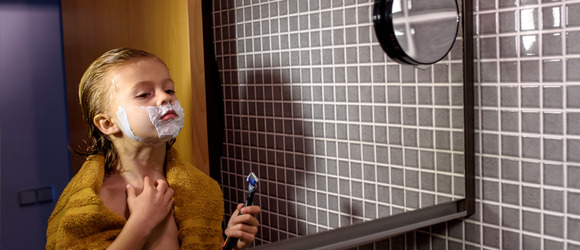
At What Age Can a Child Be Left Alone?
As a mom, it was an uncomfortable decision to start to allow my daughter to be alone in our home. Laws vary by US State or Canadian Province. Only 3 States have laws regarding a minimum age for leaving children alone and it varies from 8 to 14. In Canada, by law you can leave your child at home somewhere between the age of 10 to 12. As a parent, you are legally responsible for the decision to let your child stay home unsupervised. Age is only one factor in determining if your child is capable of handling time by themselves.
5 Other Factors to Consider
1. Child Maturity and Comfort Level
Is your child responsible? If your child has difficulty following direction or is easily frightened, you may want to consider waiting to leave them alone at all.
2. Length and Frequency being Left Alone
Leaving a child alone at home should always be a gradual process. Start with quickly running to the store during the day. Then maybe go to the gym for an hour. You should gradually build based on your child’s comfort level with the situation. Canada Safety Council recommends limiting time alone to 1 to 2 hours and only when a responsible adult is nearby.
3. Neighbours and Friends to Reach Out To
When your begin to leave your child alone, inform a few trusted neighbourhood friends and ask them if your son or daughter can call on them if they need to. And you can return the favour. This will be a great comfort to your child to know someone is close if they need immediate help.
4. Prepare and Test your Child’s Abilities and Knowledge
Most communities offer children home alone courses. Home alone courses teach children about phone safety, basic First Aid and accident prevention. Before leaving your child, you should provide a short list of emergency numbers, and discuss what is a true emergency. I personally know of a former neighbours daughter who called 911 because of a large spider :) Emergency 911 receives thousands of calls each year from kids about non-emergency matters.
5. Ability to Follow Rules
There should be some important rules established before allowing your child to stay home by themselves. Additional rules should be things that they can or cannot do while at home by themselves. These likely entail things they might do on a regular basis, that are now off limits because you are not there. It is always discouraged to have children using exercise equipment, knives, and different household appliances (waffle irons, dryers, chest freezers). Taking a child from room to room can assure that all the rules are covered. You should encourage your child to only tell close friends that they are home alone. When home alone, your son or daughter should not open the door or the answer the home phone. Parents should think twice about allowing their child to have a friend over when they are home alone, so they aren’t talked into mischief.
Conclusion
Parents should regularly speak to their child about how they feel about being home alone. If your child expresses discomfort with it, consider other alternatives like a babysitter or a relative to be present, until they feel they can handle this responsibility
Additional Resources
- Home Safety Checklist by Canadian Safety Council
- Leaving Your Home Child Home Alone by US Child Welfare Information Gateway